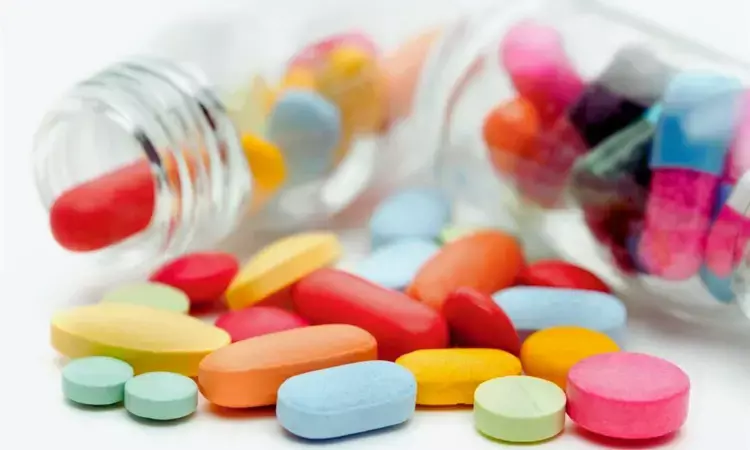- Home
- Medical news & Guidelines
- Anesthesiology
- Cardiology and CTVS
- Critical Care
- Dentistry
- Dermatology
- Diabetes and Endocrinology
- ENT
- Gastroenterology
- Medicine
- Nephrology
- Neurology
- Obstretics-Gynaecology
- Oncology
- Ophthalmology
- Orthopaedics
- Pediatrics-Neonatology
- Psychiatry
- Pulmonology
- Radiology
- Surgery
- Urology
- Laboratory Medicine
- Diet
- Nursing
- Paramedical
- Physiotherapy
- Health news
- Fact Check
- Bone Health Fact Check
- Brain Health Fact Check
- Cancer Related Fact Check
- Child Care Fact Check
- Dental and oral health fact check
- Diabetes and metabolic health fact check
- Diet and Nutrition Fact Check
- Eye and ENT Care Fact Check
- Fitness fact check
- Gut health fact check
- Heart health fact check
- Kidney health fact check
- Medical education fact check
- Men's health fact check
- Respiratory fact check
- Skin and hair care fact check
- Vaccine and Immunization fact check
- Women's health fact check
- AYUSH
- State News
- Andaman and Nicobar Islands
- Andhra Pradesh
- Arunachal Pradesh
- Assam
- Bihar
- Chandigarh
- Chattisgarh
- Dadra and Nagar Haveli
- Daman and Diu
- Delhi
- Goa
- Gujarat
- Haryana
- Himachal Pradesh
- Jammu & Kashmir
- Jharkhand
- Karnataka
- Kerala
- Ladakh
- Lakshadweep
- Madhya Pradesh
- Maharashtra
- Manipur
- Meghalaya
- Mizoram
- Nagaland
- Odisha
- Puducherry
- Punjab
- Rajasthan
- Sikkim
- Tamil Nadu
- Telangana
- Tripura
- Uttar Pradesh
- Uttrakhand
- West Bengal
- Medical Education
- Industry
EMA warns of sharp rise in illegal medicines sold in EU

European Medicines Agency (EMA) and the Heads of Medicines Agencies (HMA) are warning the public about the growing threat of illegal medicines being advertised and sold online across the European Union (EU).
In recent months there has been a sharp rise in the number of illegal medicines marketed as GLP-1 receptor agonists such as semaglutide, liraglutide and tirzepatide for weight loss and diabetes. These products, often sold via fraudulent websites and promoted on social media, are not authorised and do not meet necessary standards of quality, safety and efficacy.
Such illegal products pose a serious risk to public health. They may not contain the claimed active substance at all and may contain harmful levels of other substances.
People who use these products are therefore at a very high risk of treatment failure, unexpected and serious health problems and dangerous interactions with other medicines.
Authorities have identified hundreds of fake Facebook profiles, advertisements and e-commerce listings, many of which are hosted outside the EU. Some fraudulent websites and social media advertisements misuse official logos and use false endorsements to mislead consumers. Illegal suppliers are being actively monitored by national authorities. Enforcement actions include ordering product withdrawals, blocking websites and cross-border collaboration with enforcement officers and other international partners.
As per EMA, GLP-1 receptor agonists are prescription medicines for serious health conditions such as diabetes and obesity. They should be taken under the supervision of a healthcare professional. Patients who think they might benefit from treatment with GLP-1 receptor agonists should talk to a doctor and should not buy them without a prescription or from sources other than legitimate retailers.
Obtaining medicines from legitimate suppliers in the EU
The online sale of prescription only medicines is not allowed in all Member States.
To help the public identify legitimate online medicine retailers, the EU introduced a common logo which appears on the websites of all registered online pharmacies and retailers. Clicking on the logo takes buyers to a national register of authorised retailers.
If a website does not have this logo or is not listed on a national register, the website is fraudulent and operating illegally.
The national flag and the text are an integral part of the logo. Only national flags of an EU Member State, as well as those of Norway, Iceland and Liechtenstein, can be displayed.
Warning signs that a medicine may be illegal
A product is likely to be illegal if:
- it is advertised as “endorsed” by a national authority or features official logos of a national authority or EMA;
- it is sold through unofficial websites or social media platforms;
- it is claimed to be superior to authorised treatments without scientific evidence;
- it is not available through licensed pharmacies or healthcare providers;
- the website offering it does not have the common EU logo or is not listed on a national register.
Ruchika Sharma joined Medical Dialogue as an Correspondent for the Business Section in 2019. She covers all the updates in the Pharmaceutical field, Policy, Insurance, Business Healthcare, Medical News, Health News, Pharma News, Healthcare and Investment. She has completed her B.Com from Delhi University and then pursued postgraduation in M.Com. She can be contacted at editorial@medicaldialogues.in Contact no. 011-43720751
Dr Kamal Kant Kohli-MBBS, DTCD- a chest specialist with more than 30 years of practice and a flair for writing clinical articles, Dr Kamal Kant Kohli joined Medical Dialogues as a Chief Editor of Medical News. Besides writing articles, as an editor, he proofreads and verifies all the medical content published on Medical Dialogues including those coming from journals, studies,medical conferences,guidelines etc. Email: drkohli@medicaldialogues.in. Contact no. 011-43720751


